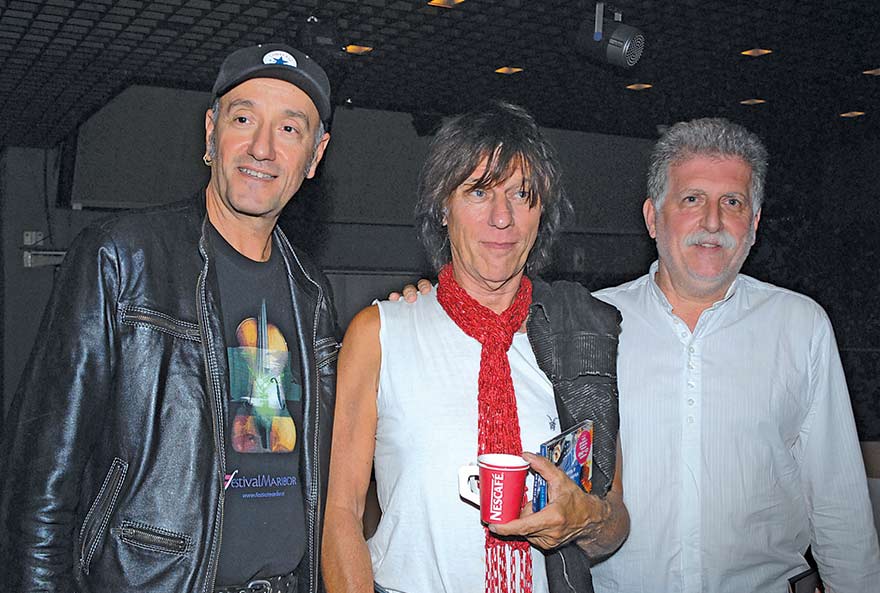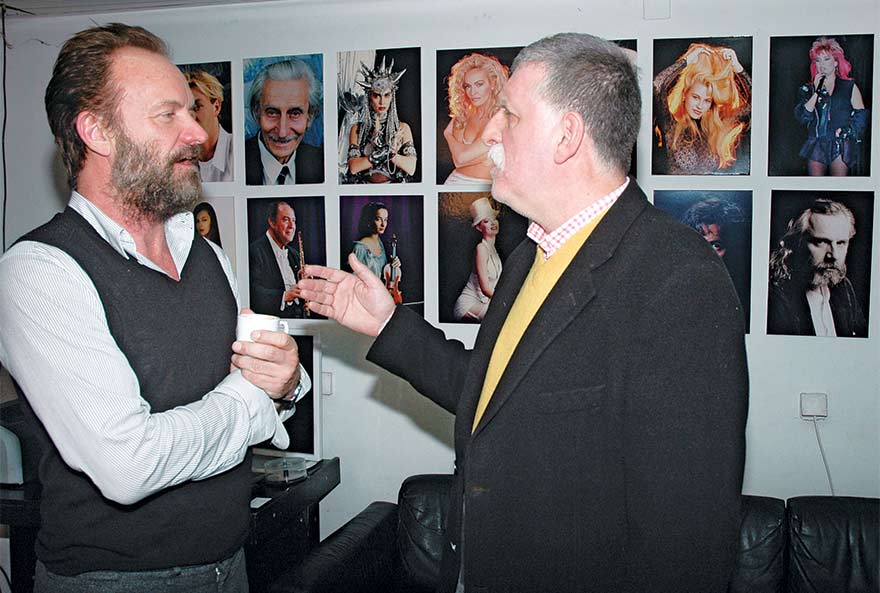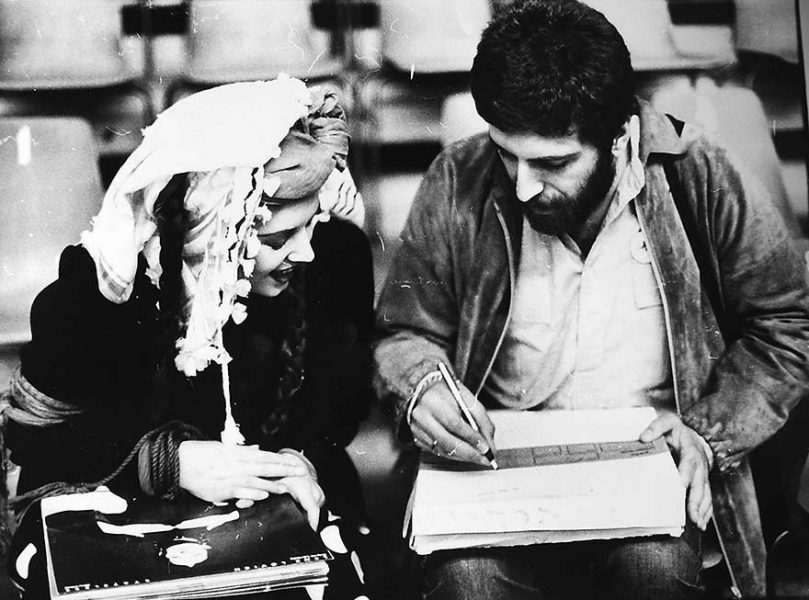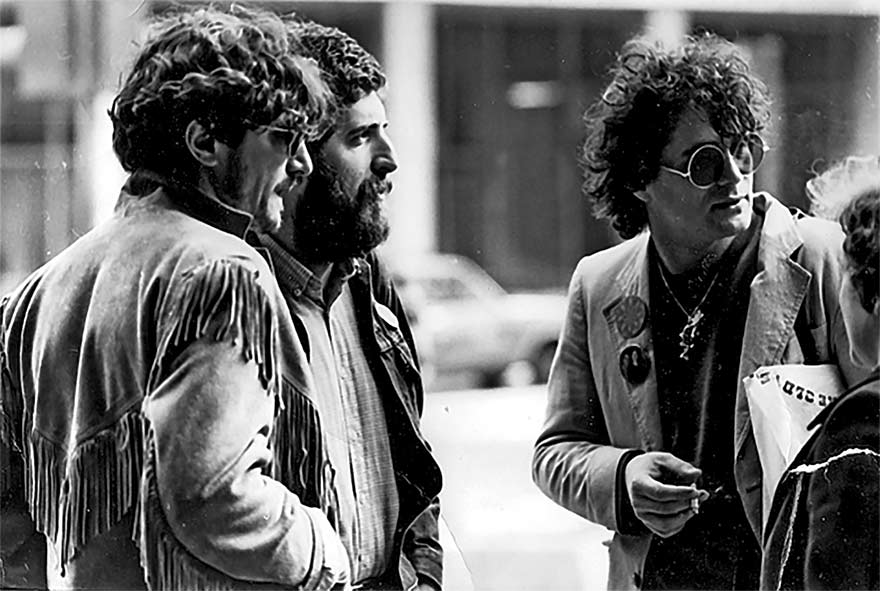His biography confirms him as one of the greatest authority on rock ‘n’ roll in the former Yugoslavia, the writer of treasured books and the author of a documentary series on rock ‘n’ roll. He is the guardian of values that belonged to a bygone country, and which he calls his emotional homeland. And according to his healthcare chart he’s also a medical phenomenon: 13 stents, eight bypasses, seven heart attacks, eight coronography procedures and two clinical deaths!
Born in Belgrade, on Topčider Hill, he always signed his name with the Cyrillic script when abroad, and no one can ban him from saying that he was born in Yugoslavia. And to be most precise he was actually born in a house, and not a maternity hospital. That’s why he says of himself that he is a home-made product, and not a serial production model. The hospital only later became his destiny. His only homeland is the house where he was born, where he grew up, “where I grew old and where I’m awaiting death”. It was from that house – which is located in a street that was once called Šenoina Street and is today known as Vajara Đoke Jovanovića Street – that Petar ‘Peca’ Popović (71) saw grass for the first time, in his garden, and learned how the sky looks when you’re looking up. That is his only homeland. He learned that home always costs too much, but that’s why it loves without limits. A house is just a building, while a home is a storehouse for indelible emotions. There every spring lasts for twelve months. And that’s been the case for decades.
Newcomers to Belgrade like to say that Topčider Hill and Senjak are actually part of Dedinje, because that sounds somehow more important to them, more elegant. They’ve heard about Dedinje because Josip Broz Tito and all the senior leaders of the former Yugoslavia lived there, as do those of today’s Serbia:
“I understand that need of theirs, but they must also understand my need not to give up that piece of land, that yard. I’m responsible for preserving that on behalf of my family. Three generations of Popovićs have never previously lived in that house, and now for the first time that’s being done by my Mira and I, my son Bogdan with his wife Maja and their son Petar. In the Popović family it’s obligatory for two names to be passed down interchangeably – Petar and Bogdan. No Popović previously lived long enough to be with his grandson. I experienced that despite my failing health. And that’s why I must teach my grandson that this is our home and not just our house, because you can have dozens of houses while you can only have one home.”

That home of his is also his most important toponym. All his schools are there; it was there that he walked and played, it’s there that stands Topčiderska Church, the oldest church in Belgrade, where his parents were married, Peca and his sister were baptised, where he was wed to his wife Mira, and where his children were also baptised.
There is also the Topčider Cemetery, where he will be buried and where his parents also rest. That is his micro world:
“I have that problem that I’ve had to justify myself all my life because I was born and live in that area. My personal tragedy is that I’m now the only native in that street. That’s how much history has changed in 70 years. How challenging that part of Belgrade is for new winners? There’s no winner from any war or any coup who didn’t want to be legalised in that part of Belgrade.”
I know that many people resent my theory that the mayor of Belgrade must be born in Belgrade. And they must!
Peca also has his own emotional homeland, and that’s a space in which the same feelings function, are cultivated and understand one another, and those feelings can only be transmitted through language and humanity:
“When I say emotional homeland, that means the homeland in which we grew up, in which we learned how to love, to respect people who differ from us. That’s the space where we didn’t want to give up everything that’s been done to us by history in the meantime; that’s the space we proudly carry with us when we go before God to confess. That is a space filled with wonderful memories, filled with wonderful people, filled with things about which we’re not ready to say we didn’t love and to just give up.”
Back in 1949, when Peca was born, Belgrade had 375,000 inhabitants, while today it is home to 1.7 million people. He played football in his street as a child, but today he can’t even traverse all the parked cars as he pushes his grandson in his pram:
“Everything has changed, but something obliges one to defend that city in the way it was defended by our role models. And they defended normalcy. Belgrade, as the capital, must be an example. It must be an example in architecture, traffic, ecology, culture, behaviour; it must be an example in promoting values. Belgrade has never promoted as much rubbish as it does now.
Despot Stefan Lazarević didn’t deserve that, nor did Vuk Karadžić, as the first mayor in the liberated Serbia. That isn’t deserved by all of us who’ve lived in Belgrade for all these years and won’t abandon it.

“I know that many people resent my theory that the mayor of Belgrade must be born in Belgrade. And they must! Why?
“If the mayor of Belgrade was born in Belgrade, when they brought a decision like “now I’ll erect a monument right here, now I’ll change the name of this street, now I’ll spend three years renovating an important city artery”, he would be called out by his grandparents, by those who’ve known him since he was born, who would say: ‘Hey, son, dear neighbour, what are you doing? How are you not ashamed?’ You can’t be the mayor of London or Paris if you weren’t born there. You have to understand the city, to understand its nature, not to come to that city just to treat your provincial complexes. History is not created through rape, because love by force is rape. History is primarily created through vision, reason and goodness.”
Just as he won’t surrender his beloved Belgrade, Peca also finds himself unable to give up Yugoslavia. He is unable to remain indifferent when he hears the national anthem ‘Hey. Slavs’. He then recalls everything that was beautiful in that country. He recalls the geography and biology, and the wonderful experiences he had growing up:
“Finally, I belong to a family that had houses in Crikvenica, Tučepi and Vodice. And no one can convince me that the Adriatic Sea isn’t my sea, that those Slovenian mountains aren’t also my mountains, that those Montenegrin lakes aren’t my lakes, that the Bosnian landscapes and all those winding roads aren’t my roads too. After all, by working on labour actions, by serving in the army, I also built something in that country. I’m connected to it, and you can’t take a hammer or a mallet and knock that out of me. All of that makes me the kind of man I am today.
“I understand that the chiefs of these newly established tribes incite the people to forget that past. But there are some things they can never be separated, and they are emotions and language.
“If we cannot live like brothers, then we should live like neighbours. I’ve never abandoned my neighbours, nor my brothers.”
We know the art of the 20th century according to soloists. All the great artists were soloists. And the Beatles were the first time we got a collective creative core
Peca’s family was fated to be scattered all over the world. That is how packages arrived from abroad on Topčider Hill, and that was his greatest joy back in the 1950s. He often imagined how wonderful it would be if he was the pilot of a plane carrying all those packages. When he travelled to all the countries that he’d imagined and dreamt of, he learnt that the real meaning of life is to go further and to explore why that world is so colourful and interesting. This realisation was made possible for him by music, it was made possible by rock ‘n’ roll:
“I had the good fortune of being one of that circle of self-taught people who got a chance to explain why the music we listen to is so important for the generation to which we belong. That wasn’t a rebellion against those who were older. That was our way of saying: ‘well, we are like this and we see the world in this way’. That view of the world was invaluable in the second half of the 20th century. Without that view, today we wouldn’t have the most important writers, painters, musicians, directors, poets, filmmakers, designers etc. And, let’s be honest, the most important successors. Today, for the first time in the history of Belgrade, we have a 25-year-old boy whose song is number one on the Billboard Hot 100 chart in America. It is sung by Cardi B, a famous rapper from the Bronx, New York, the song is called “Up”, and the author is a Belgrader called Ying Dza. Imagine someone having told you in 1966 – when we listened to Bob Dylan, the Beatles or Joan Baez – that someone from Belgrade will one day be number one?!”
It’s rare that you’ll meet someone with such a rock ‘n’ roll biography as Peca. He was editor-inchief of the two most successful journals in the history of Yugoslav rock periodicals. (Jukebox and ROCK). He participated in the launch of two weekly magazines and a daily newspaper under the Politika brand (Intervju, ROCK and Sportski žurnal). He has also contributed to the staging of the majority of the biggest music events in Belgrade.

He seriously rolls the letter r, but is nonetheless the recipient of two annual awards of Radio Belgrade (1971, 1972) and one of Studio B (1978). He was the first music editor of the first music radio station in the Socialist Yugoslavia (Radio 101 RTB, 1989). He is the author of the longest-running documentary rock series of Television Belgrade (Rokumenti, 1995). He was also the editor of the first independent television company in the Socialist Yugoslavia – for the whole of one month (OK Kanal, 1989), until that TV company was banned:
“I’m happy that I’ve used this hand to greet everyone I ever wanted to meet from the world of popular music. Thanks to music, I’ve met people whose posters I previously pasted on my walls, with whose songs I learned English and French. That’s a wonderful feeling. And it’s an even better feeling when you know that you were close to some talented people from your own country, so I had the opportunity to encourage them, to push them, to guarantee with my name that the recording of some record wouldn’t be in vain, to participate in some important festivals… Well, I’m proud of that because I did it with the greatest conviction that that was quality that deserved to be recognised in this environment. My greatest satisfaction is the fact that I sleep with a clear conscience when I go to bed. I know that I never cheated anyone and I know that I did it without money being an issue. I’m glad that I was close to all the key career people in the former Yugoslavia who belonged to popular music.”
Peca often says that he was lucky to have met all five Red Star stars, that he lost games of chess to three world champions – Petrosian, Tal and Kasparov! That he met great stars of world film and music such as Harvey Keitel, Vanessa Redgrave, Ava Gardner, Tina Turner, Joan Baez, Lemmy, Nina Simon, David Byrne, Eric Clapton et al. He claims that you have to have luck and a dream that you want to realise.
We can’t enter a better future properly with people from the world of crime, war profiteers, instigators against other nations
Is it possible to present the greatest rock ‘n’ roll authority without asking him about the Beatles and immediately receiving an interesting explanation of the spectacular contribution of these Liverpudlian mop-tops to changing the very code of civilisation:
“We know the art of the 20th century according to soloists. All the great artists were soloists. And the Beatles were the first time we got a collective creative core. The Beatles were the first to conquer and change the world without firing a shot. And that was the ideal of both Stalin and Hitler, and all the great conquerors. Despite there being no internet, the Beatles did it easily. There wasn’t a street in the world where the Beatles weren’t known. After them and their example, our world is not the same.”
How much freedom was there in the old Yugoslavia when it came to music; what did censorship look like during the second half of the 20th century? CorD’s interlocutor reminds us that we recently saw the commemorating of the 40th anniversary of the release of the album Paket aranžman [Package Tour], a compilation record of the Belgrade pop groups Šarlo Akrobata [Charlot the Acrobat], Električni orgazam [Electric Orgasm] and Idoli [The Idols]. When it was released in 1981, that record was taxed as being trash:
“Don’t forget that the best-selling record of Riblje čorbe, the song Mrtva priroda, released in 1981 (selling 531,000 copies in one gulp!), was also taxed as being trash, due to the verse “Fools die for ideals” and “Nothing new in the West”. The time of freedom has changed over past decades.”
Peca often says, quoting Confucius, that every society has the kind of music it deserves. For him it is incidental that we today have that young man who currently has the world’s number one song, because that’s not a consequence of the cultural policy implemented here:

“Don’t forget that we live in a country where a political press conference is broadcast on 13 channels, and I hear that now one television station has decided to make a show about rock music. And in 1967 we had the following situation. Nikola Karaklajić, together with Jovan Ristić, made the TV show Koncert za mladi ludi svet [Concert for the Young Crazy World]. This happened eight and a half years before Queen recorded Bohemian Rhapsody, which is considered the world’s first music video. And the show Koncert za mladi ludi svet was composed of music videos of domestic tracks that had been shot with a film camera by Jovan Ristić, aka Rica. The national television News Journal was moved to another slot due to that show. That’s because Koncert za mladi ludi svet was broadcast on Mondays from 6.30pm to 7pm. In Yugoslavia at that time they couldn’t hold the sixth and final class of the school day, because all the children fled from school to get home in time for the show. In order to prevent that, they moved the show to 7pm and the News Journal from 7pm to 7.30pm. That’s what music was during those years, and its significance! And what about today?
“Today we have shows about ‘starlets’, about thugs from the streets and the national assembly, shows about criminals who confess their sins, while we don’t have a programme that would follow what’s being done by some young people do who believe that their song can change their neighbourhood, their school, Belgrade, the region, or their emotional homeland, who believe they can change the world. If we don’t enable children to be able to imagine, to be able to influence a change in values, then what is the perspective of a country? I believe deeply that it is the duty of every state with serious ambitions to think about what its children are growing up to become.”
And we mustn’t forget, warns Peca, that we first had everything and only then lost it all. We had sanctions, wars in the surrounding area, we had bombing, we had different kinds of dictatorships, now we’re going through a pandemic:
“Well, hold on, when will all the tribulations we’re going through come to an end? With what defects will we emerge from all of this, is anyone thinking about that? We can’t enter a better future properly with people from the world of crime, war profiteers, instigators against other nations. We can only enter this world, ours or the global one, as educated carriers or benefactors of the values of civilisation. It’s no coincidence that fifty to sixty thousand educated young people leave here to go abroad for their real chance every year. They’re seeking everything they don’t have here. Once upon a time it was manual workers who went to seek the chance of a better life, but today it is the most educated who are leaving. And who is left to build the future of this country? That’s what concerns me.”
We can only enter this world, ours or the global one, as educated carriers or benefactors of the values of civilisation
Peca had his first heart attack at the age of 32, and didn’t believe he’d live with the disease longer than he’d been healthy. For him, this is proof of how much medicine, cardiology, cardiac surgery, vascular surgery and interventional cardiology have advanced:
“My father died of his first heart attack. Also dying of their first heart attacks were my uncles in Scotland and Canada, my grandmother and my uncle in Lika. My father lived to be 57, my uncles were 43 and 44… and I am proof that, despite everything, one can live to an undeserved old age.”
Knowing all of this, it comes as no surprise that Peca is also an honorary member of the Serbian Medical Association:
“I think there are only four of us honorary members of the Serbian Medical Association. I believe that I qualified thanks to my rich healthcare biography. There are few people in this environment who have 13 stents, eight bypasses, seven heart attacks, eight coronography procedures, two clinical deaths… Finally, all this is certified with Corona. So, I guess I deserved that honorary title? That was probably also a recommendation for me to have now been the president of the Association of Patients with Heart Weaknesses for two months. I care about encouraging people who are facing heart disease to see that this is not the end of the world. And not to be ashamed of their illness. Do you know that in Serbia it isn’t shameful to be a criminal, it isn’t shameful to be a thief, but it is shameful to admit that you are sick. And it is very expensive to be sick.
“Let me tell you my example. I was released from the Bežanijska Kosa hospital in December last year. I took away wonderful experiences from there, starting from the doctors to everyone who works there without a break, providing careful treatment and where everything was free. From then until today [09.03.2021), I have spent more than 750 euros on post-Covid medicines.”
Behind everything Peca lives for and does, stands one woman – Mira Pantić Popović, a judge and then a lawyer, whom he met on 13th August 1974, and they’ve been together every day since (except when one of them is in hospital!). They were married on 2nd February 1980 and have two sons, Bogdan (1981), a lawyer, and Dušan (1984), a film director. Bogdan and his wife, lawyer Maja, gave them their grandson, Petar, in 2020.
The house and yard from the beginning of this interview have become legendary: many musical careers began there, rock bands were created, concerts were arranged, such as the historical one at the Hajduk Fountain in 1977, when Bijelo dugme definitely conquered Yugoslavia. Zdravko Colic’s debut at Marakana was designed there. The songs Računajte na nas [Count on us] and Lutka sa naslovne strane [Cover Page Doll] were first heard there, and it was there that many who are famous today had there first concerts, exhibitions, performances. And the house contains enough material for an entire museum – magazines, books, photographs, records… When their son Bogdan was born, a three-day musical happening was held with Štulić, Bregović, Đorđević, Rundek and the members of Iron Maiden.
Today, from that yard, as the first Popović to work abroad, Bogdan is heading to Milan with his family, where he’s landed a good job at the headquarters of Unicredit Bank.